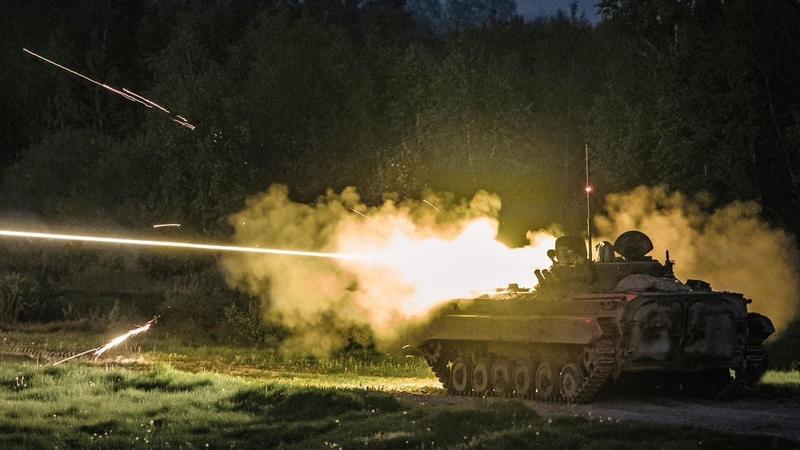This week, we discuss the well-being of America’s teachers; why Ukraine is a breeding ground for Russian private military companies; policy changes related to psychedelics; preparing for conspiracy theories about artificial intelligence; what medical consensus says about health care for transgender veterans; and what U.S. policy in Ukraine may be lacking.
How Are America's Teachers Doing?
For teachers, rates of job-related stress have returned to pre-pandemic levels. This may be good news, but teachers continue to report worse well-being than the general population of working adults.
New results from our 2023 State of the American Teacher Survey provide some insights:
- Twenty-three percent of teachers said that they were likely to leave their job by the end of the 2022–2023 school year. The top reasons why they intended to leave: stress and disappointment of the job, salary, and number of working hours.
- Black teachers reported significantly higher rates of burnout than white teachers. Study coauthor Elizabeth Steiner says that the survey data suggests a “pattern that plays out in real life. Black teachers do turn over [and] leave their jobs at higher rates than white teachers.”
- Female teachers reported significantly higher rates of frequent job-related stress and burnout and were less likely to report feeling resilient to stressful events than male teachers.
- Three-quarters of teachers reported access to at least one type of well-being or mental health support in 2023. But only slightly more than half of teachers said these supports were adequate.

Wagner fighters wave flags of Russia and Wagner group on top of a building in an unidentified location in Ukraine
Photo by press service of Concord/Handout via Reuters
Ukraine Is a Breeding Ground for Russian PMCs
The war in Ukraine has brought the Wagner Group, Russia's largest private military company, out of the shadows. But Wagner isn't alone. The war has also led to the expansion of other private military companies—and the founding of new ones. RAND experts say this “explosion of what are essentially private armies” could have devastating impacts. Ultimately, the Ukraine war may be a catalyst for bloodshed elsewhere in the world at the hands of Russian PMCs.

Psilocybin mushrooms displayed by a grower in Denver, Colorado, November 4, 2020
Photo by Trevor Hughes/Reuters
State and Local Policy Is Changing for Psychedelics. What Will the Feds Do?
Psychedelics such as psilocybin, MDMA, and LSD are attracting interest as treatments for mental health conditions. This has led some states and cities to change their laws—a shift akin to what began decades ago with medical cannabis. This time around, the changes are happening much faster, say RAND experts. And as more states and localities liberalize their approach to the supply and use of psychedelics, federal policymakers will face mounting pressure to address tough policy questions.
The AI Conspiracy Theories Are Coming
For as long as there have been scientific breakthroughs and innovations, people have been attaching such developments to conspiracy theories. Artificial intelligence is no different, says RAND's Douglas Yeung. In fact, AI is “ready-made for conspiratorial thinking.” Thus, it's important not only to track AI conspiracy theories, but also to actively counter misinformation. “The time to do this is now,” Yeung says, “before conspiracy theories take hold in the minds of the public.”
What Medical Consensus Says About Care for Transgender Veterans
Recently proposed legislation would prevent the Department of Veterans Affairs from beginning to offer gender confirmation surgery and restrict its ability to provide medications that are already prescribed to transgender veterans. According to RAND's Kayla Williams, these provisions do not align with medical consensus and would harm vulnerable veterans. “Medical providers and researchers are best-positioned to determine what care is appropriate and effective,” she says.

A military operation in Donetsk, Ukraine, June 9, 2023
Photo by Latin America News Agency via Reuters
How Not to Help Ukraine
According to RAND experts, America's strategy in Ukraine is a case in which the whole is less than the sum of its parts. Individually, most U.S. decisions make sense. For instance, it's logical for Washington to be opaque about its goals in the conflict and hesitant to provide Kyiv with high-end weapons. But when judged collectively, these decisions add up to a “messy” strategy for supporting a war. Thankfully, Ukraine can still win, they say, but the United States “needs the will and strategy to embrace that victory.”
Listen to the Recap
Get Weekly Updates from RAND
If you enjoyed this weekly recap, consider subscribing to Policy Currents, our newsletter and podcast.








